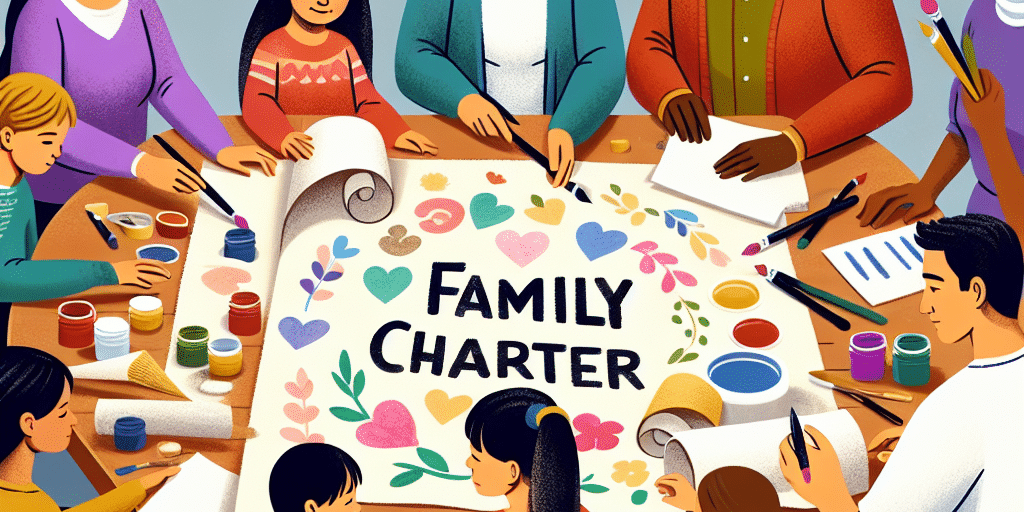In today’s fast-paced world, where individualism often takes precedence over collective identity, the establishment of a family charter can serve as a vital tool to forge stronger connections among family members. A family charter is a written document that outlines the principles, values, and commitments that guide a family’s decisions, behaviors, and interactions. At the heart of this process lies the significance of family values, which breathe life into the charter, shaping the family’s identity and fostering a harmonious environment.
Understanding Family Values
Family values are the beliefs and principles that dictate how family members interact with one another and the world around them. These values often stem from cultural, religious, and personal experiences, serving as a moral compass for the family. Popular family values include respect, honesty, kindness, responsibility, and support. These core tenets play an essential role in creating a foundation of trust and understanding among family members.
Why a Family Charter?
Creating a family charter is not just an exercise in writing; it is an intentional act that brings family members together. Here are some compelling reasons why establishing a family charter is crucial:
1. Clarifies Expectations
A family charter helps clarify what behaviors and attitudes are important to the family. This clarity can minimize misunderstandings and conflicts, as everyone knows what is expected of them.
2. Fosters Communication
The process of creating a family charter provides an opportunity for open dialogue, encouraging family members to express their thoughts and feelings. This communication strengthens bonds and can lead to deeper relationships among members.
3. Promotes Accountability
When values are articulated within a family charter, family members can hold each other accountable to those standards. This fosters a sense of commitment and responsibility for upholding the family’s shared principles.
4. Encourages Unity
A family charter serves as a unifying document that family members can refer to in times of conflict or uncertainty. It reinforces the idea that the family is a cohesive unit, working towards common goals and values.
5. Adapts to Change
As families grow and evolve, so too should their charter. A family charter is a living document that can be revisited and revised as circumstances change, ensuring that it remains relevant to the family’s dynamics.
Crafting the Family Charter: Steps to Take
Creating a family charter requires thoughtful consideration and collaboration. Here are some steps to guide the process:
1. Gather Family Members
Schedule a family meeting with all members present, ensuring that everyone’s voice is heard. Whether it’s a small immediate family or a larger extended clan, everyone’s input is valuable.
2. Discuss Core Values
Engage in open discussions about what values are most important. This may involve reflecting on shared experiences and the qualities that each member admires in one another. Consider using prompts such as, "What does being a family mean to us?" or "What values do we want to instill in future generations?"
3. Draft the Charter
Based on the input gathered, draft the family charter. This can include sections on family mission, values, commitments, goals, and even family traditions. Be sure to use clear and inclusive language.
4. Review and Revise
Invite feedback from all family members on the draft. This step ensures that everyone feels represented and that their opinions matter. Be open to revisions based on their input.
5. Formalize and Display
Once the charter is finalized, consider displaying it prominently in the home as a constant reminder of the family’s shared values and commitments. This could be done through a framed print or a creative art piece that everyone participates in.
6. Regular Check-ins
Schedule regular family meetings to review the charter and assess how well family members are adhering to the values outlined. Make adjustments as needed and celebrate the commitment to maintaining a loving family environment.
Conclusion
A family charter is more than just a document; it represents a commitment to fostering strong relationships and nurturing a sense of belonging. By emphasizing family values, families can craft a charter that not only outlines behavior but also strengthens the ties that bind them together. In an age where individualism often overshadows community, the creation of a family charter is a powerful step toward building a legacy of love, respect, and connection that can endure through generations. After all, it’s in our connections that we find true fulfillment.











